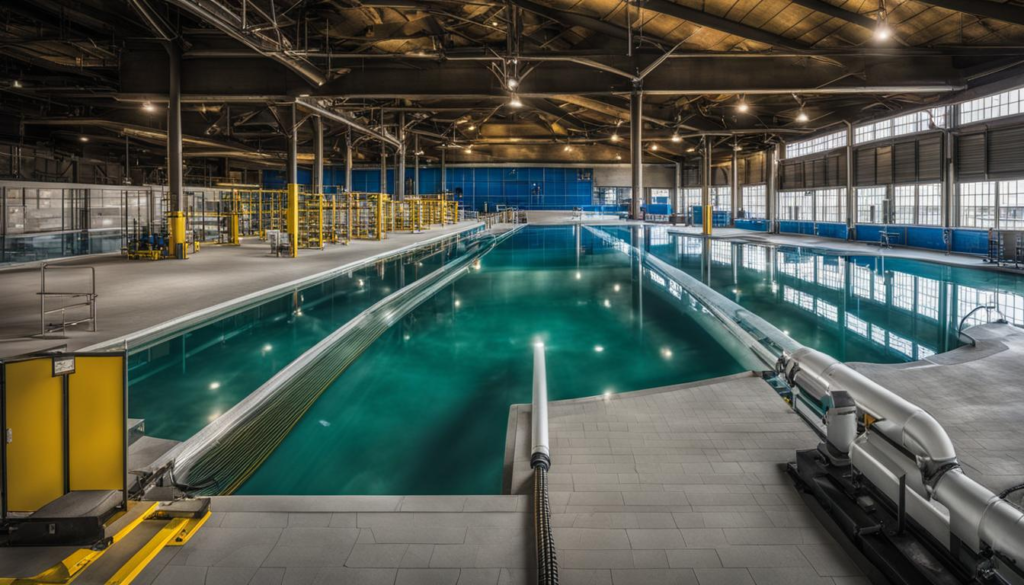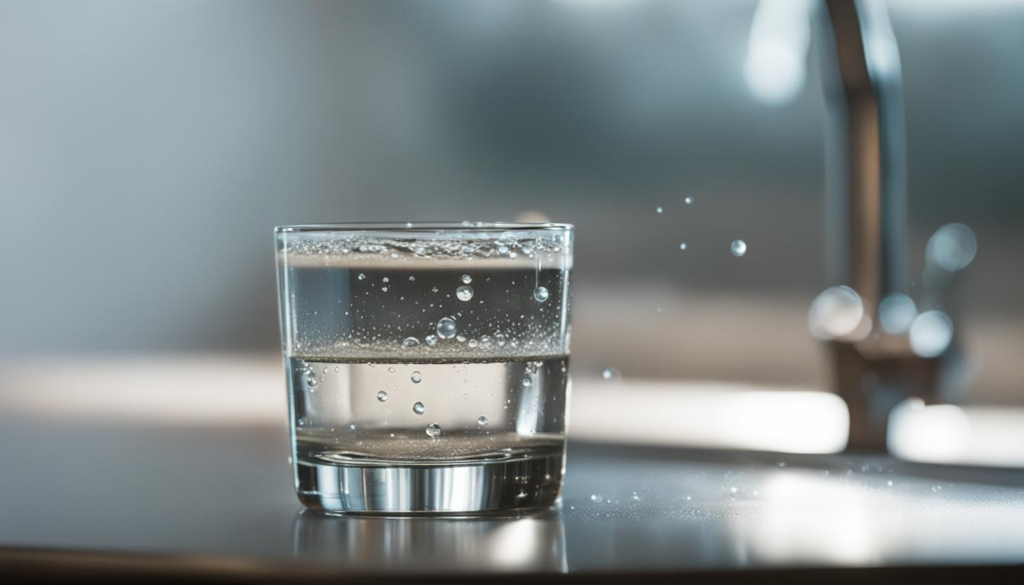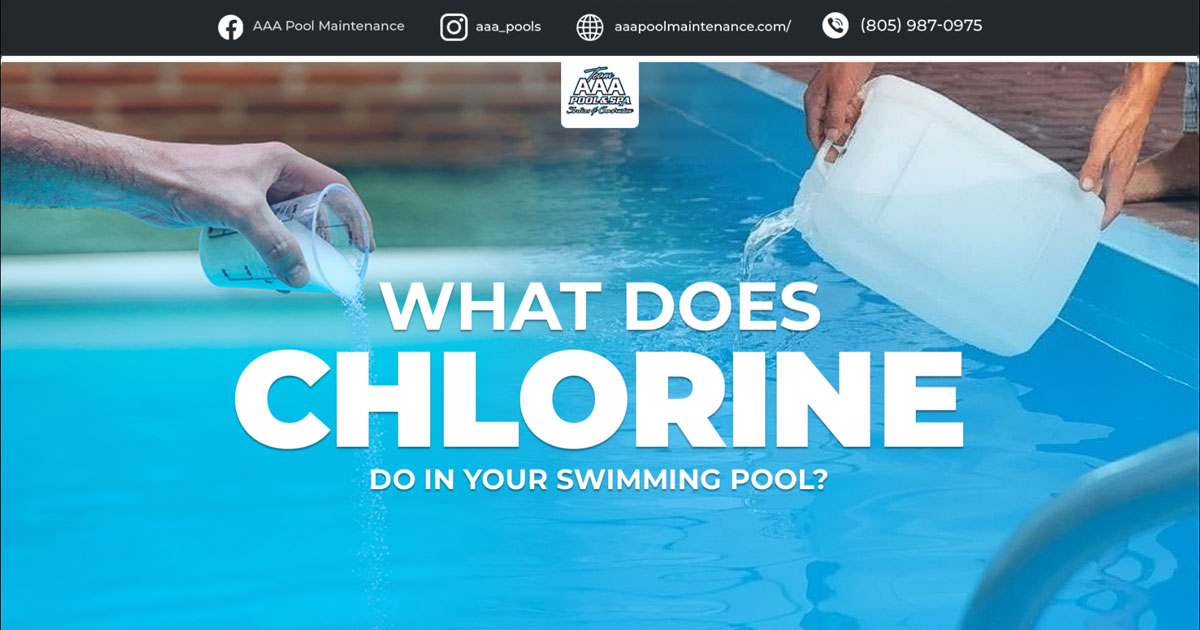Welcome to AAA Pool Maintenance, your trusted experts in pool and spa maintenance, construction, and repairs for over 50 years in Camarillo and Ventura County. We are here to provide you with valuable information about the power of chlorine, its various uses, benefits, and important safety tips. Chlorine, a versatile chemical element, plays a vital role in various industries, from water treatment to healthcare and advanced technology. Understanding the proper use and precautions of chlorine is crucial for maintaining a safe and healthy environment.
Create an image showcasing the power of chlorine in various settings, such as a swimming pool, drinking water treatment plant, and industrial applications. Incorporate the benefits of chlorine, such as its ability to kill bacteria and viruses, prevent diseases, and maintain water quality. Use vivid colors and geometric shapes to convey the effectiveness and versatility of chlorine in different scenarios.
Key Takeaways:
- Chlorine is a chemical element with diverse uses and benefits.
- It is widely used in water treatment to disinfect and make water safe to drink.
- Chlorine is an effective household disinfectant used in bleach for cleaning and sanitizing.
- It plays a significant role in food safety by eliminating harmful bacteria.
- Chlorine is essential in healthcare, advanced technology, energy, building, transportation, and defense industries.

The Importance of Chlorine in Water Treatment
When it comes to providing clean and safe drinking water, chlorine plays a critical role in the process of water treatment. By effectively disinfecting water, chlorine helps to eliminate harmful bacteria, viruses, and other microorganisms that can cause waterborne diseases. This essential chemical element has revolutionized how we approach water sanitation and has greatly reduced the prevalence of waterborne illnesses.
Before the widespread use of chlorine-based disinfectants, waterborne diseases like cholera and typhoid fever were rampant. The introduction of chlorine disinfection has significantly reduced the risk of such diseases, making safe drinking water readily available to communities worldwide. With chlorine, we can confidently turn on the tap and trust that our water is free from harmful pathogens.
Chlorine’s importance extends beyond drinking water. It is also widely used to maintain clean and safe swimming pools. By killing waterborne pathogens that can cause illnesses, chlorine disinfection ensures swimmers enjoy a hygienic and healthy swimming environment. Whether it’s in our homes or at public facilities, chlorine’s role in water treatment and swimming pool disinfection is indispensable for maintaining public health and safety.
The Benefits of Chlorine in Water Treatment:
- Effectively disinfects water and eliminates harmful bacteria and viruses
- Reduces the risk of waterborne diseases like cholera and typhoid fever
- Makes clean and safe drinking water readily available
- Ensures hygienic and healthy swimming environments
| Water Treatment Highlights | Chlorine Benefits |
|---|---|
| Eliminates harmful bacteria and viruses | Protects public health by reducing the risk of waterborne diseases |
| Provides clean and safe drinking water | Ensures access to hygienic water for consumption |
| Maintains clean and safe swimming pools | Creates a healthy environment for swimmers |
Chlorine as a Household Disinfectant
In households worldwide, chlorine bleach is a trusted ally in maintaining cleanliness and hygiene. Produced by companies like AAA Pool Maintenance, chlorine bleach is a powerful household disinfectant that offers many benefits. Whether you’re looking to whiten your clothes, sanitize kitchen surfaces, or combat germs during flu season, chlorine bleach is an essential tool in your cleaning arsenal.
The Power of Chlorine Bleach
Chlorine bleach effectively kills germs, bacteria, and viruses, making it an excellent choice for disinfecting various surfaces. Whether you’re tackling common household surfaces like countertops, sinks, and floors or dealing with tougher stains on clothing, chlorine bleach is up to the task. By incorporating chlorine bleach into your cleaning routine, you can ensure that your living spaces are not only visually clean but also free from harmful microorganisms.
When using chlorine bleach, it’s essential to follow proper safety guidelines. Always dilute the bleach according to the manufacturer’s instructions and wear protective gloves and eyewear to prevent accidental contact with skin or eyes. Additionally, ensure proper ventilation to avoid inhaling strong fumes. By using chlorine bleach responsibly, you can harness its disinfecting power while keeping yourself and your family safe.
A Versatile Cleaning Solution
Chlorine bleach’s versatility extends beyond its disinfecting properties. It is also an excellent stain remover and fabric whitener. By adding chlorine bleach to your laundry, you can brighten whites and remove stubborn stains. Additionally, chlorine bleach can be used to clean and sanitize bathroom fixtures, cutting boards, and other hard surfaces.
In the fight against germs and bacteria, chlorine bleach is an invaluable ally in maintaining a clean and healthy home. From laundry to kitchen and bathroom surfaces, chlorine bleach offers a reliable solution for disinfection and cleanliness. Incorporate chlorine bleach into your cleaning routine and experience its powerful benefits for yourself.
A close-up view of a transparent glass filled with water and a few drops of chlorine bleach dispersing into the water, creating a fuzz of bubbles. The glass can be seen on a clean and polished countertop.
Table: Common Household Uses of Chlorine Bleach
| Area | Uses |
|---|---|
| Kitchen | – Sanitizing cutting boards – Disinfecting countertops and sinks – Removing stains from plastic containers |
| Bathroom | – Cleaning and sanitizing toilet bowls – Removing mold and mildew from grout – Brightening tile surfaces |
| Laundry | – Whitening white clothing – Removing stains and odors – Disinfecting towels and bedding |
| General | – Sanitizing toys – Cleaning and disinfecting garbage bins – Removing stains from hard surfaces |
Source: AAA Pool Maintenance
Chlorine in Food Safety
Chlorine ensures food safety by protecting crops from pests and disinfecting food-contact surfaces. Its use in the food industry helps eliminate harmful bacteria such as E. coli and salmonella, reducing the risk of foodborne illnesses.
Chlorine is commonly used as a disinfectant in food production facilities to sanitize equipment, utensils, and processing surfaces. Its powerful antibacterial properties make it effective in killing pathogens that can contaminate food during processing and handling.
Additionally, chlorine is used in water treatment systems for agricultural irrigation, ensuring that crops receive clean water free from harmful microorganisms. This helps maintain the quality and safety of fresh produce.

.
The Importance of Chlorine in Food Safety
The use of chlorine in food safety is crucial for protecting public health and preventing foodborne illnesses. By employing appropriate chlorine concentrations and monitoring its usage, the food industry ensures the production of safe and abundant food for consumers.
| Chlorine in Food Safety | Benefits |
|---|---|
| Kills harmful bacteria like E. coli and salmonella | Reduces the risk of foodborne illnesses |
| Sanitizes food-contact surfaces | Prevents cross-contamination |
| Aids in maintaining the quality and safety of fresh produce | Protects crops from waterborne pathogens |
Chlorine’s role in food safety extends beyond the production process. It is also used in water treatment systems for beverage production, ensuring that drinking water and the ingredients used in beverages are free from harmful contaminants.
By incorporating chlorine into food safety practices, the industry upholds strict sanitation standards, safeguards public health, and provides consumers with safe and nutritious food.
Chlorine in Healthcare and Advanced Technology
Chlorine, known for its versatility, is not only essential in water treatment and household disinfection, but it also plays a vital role in the healthcare sector and advanced technology. With its unique properties, chlorine contributes to the manufacturing of a wide range of medical products, including respiratory inhalers, safety glasses, and contact lenses. These chlorine-based medical devices and materials are crucial for ensuring the well-being and safety of patients.
In addition to healthcare, chlorine chemistry is instrumental in driving advancements in technology. Fast processors used in electronic devices, such as smartphones and computers, are produced using chlorine. Furthermore, chlorine is used in the manufacturing of components for solar panels, air conditioning refrigerants, and hybrid car batteries. These applications highlight the indispensable role of chlorine in building a sustainable future.
The diverse applications of chlorine in healthcare and advanced technology demonstrate its significance in improving lives and driving innovation. By leveraging chlorine’s unique properties, the medical and technological industries continue to develop products and solutions that enhance health, safety, and convenience.
“Chlorine’s contribution to healthcare and advanced technology is undeniable. Its use in medical devices and the production of electronic components showcases its versatility and importance in our daily lives.”
– AAA Pool Maintenance
Chlorine in Energy and Environment
Regarding energy and the environment, chlorine is crucial in harnessing solar energy and promoting sustainability. By purifying silicon for solar panel chips, chlorine enables the efficient conversion of sunlight into electricity. This process is instrumental in reducing our reliance on non-renewable energy sources and mitigating the effects of climate change. Additionally, chlorine-based epoxy resins are used in manufacturing wind turbine blades, which capture and convert the power of the wind into clean, renewable energy.
The use of chlorine in renewable energy extends beyond solar and wind power. It also contributes to producing components for air conditioning refrigerants, hybrid car batteries, and other advanced technologies. By leveraging chlorine’s unique properties, we can create faster processors for electronic devices and enhance the efficiency of energy-consuming systems. This not only drives innovation but also helps us move towards a more sustainable future.
Chlorine and Our Environment
Chlorine’s impact on the environment extends beyond its role in renewable energy. It is essential to note that chlorine chemistry has made significant advancements in reducing environmental pollution. For example, chlorine-based water treatment processes help ensure that clean and safe drinking water is available to communities worldwide. Without chlorine disinfection, waterborne diseases would pose a significant threat to public health.
| Chlorine in Water Treatment | Benefits |
|---|---|
| Effective disinfection of water | Prevents the spread of waterborne diseases |
| Reduces the risk of bacterial contamination | Protects public health |
| Eliminates harmful pathogens | Maintains safe and clean swimming pools |
“Chlorine’s ability to disinfect water and kill harmful pathogens is crucial for maintaining public health and safety.”
Overall, chlorine’s contributions to energy and the environment are multifaceted. It enables the harnessing of solar and wind power, promotes sustainability, and enhances our technological capabilities. Moreover, chlorine’s role in water treatment ensures that we have access to clean and safe drinking water, protecting public health. By embracing chlorine’s potential and utilizing it responsibly, we can continue to strive towards a greener and healthier future.
Chlorine in Building and Construction
Chlorine chemistry plays a vital role in the building and construction industry, contributing to the creation of energy-efficient materials and durable finishes. From enhancing insulation to improving the longevity of paints, chlorine-based products offer significant benefits in various construction applications.
Energy-Efficient Windows
One of the key areas where chlorine is utilized is in the manufacturing of energy-efficient windows. These windows are typically made from vinyl, a material derived from chlorine. Vinyl windows have excellent insulating properties, helping to reduce heat transfer and maintain a comfortable indoor temperature. By minimizing heat loss and gain, energy-efficient windows can lower heating and cooling costs, making them a sustainable choice for homeowners and businesses alike.
Durable Paints
In the realm of interior and exterior finishes, chlorine plays a crucial role in the production of durable paints. Chlorine-based compounds are integrated into paint formulations, enhancing their adhesive properties and resistance to fading, peeling, and weathering. This results in high-quality paints that can withstand harsh environmental conditions, ensuring long-lasting protection for buildings and structures. With chlorine technology, paints can maintain their vibrant appearance and structural integrity, providing aesthetic appeal and durability.
| Chlorine in Building and Construction | Benefits |
|---|---|
| Energy-Efficient Windows | Reduces heating and cooling costs |
| Durable Paints | Enhances longevity and resistance to weathering |
As a testament to the effectiveness of chlorine in the building and construction industry, AAA Pool Maintenance, a reputable company with over 50 years of expertise in pool and spa maintenance, construction, and repairs in Camarillo and Ventura County, continues to utilize chlorine-based materials in their projects. Their commitment to providing high-quality services and sustainable solutions aligns with the undeniable advantages of chlorine in the built environment.
With its significant contributions to energy efficiency and durability, chlorine chemistry continues to shape the future of building and construction, promoting sustainable practices and ensuring the longevity of structures.
Contact AAA Pool Maintenance today at (805) 987-0975 to learn more about their expertise in chlorine-based solutions for building and construction projects.
Chlorine in Defense and Law Enforcement
Chlorine chemistry is not only integral to our daily lives but also plays a crucial role in defense and law enforcement. Its unique properties and applications enable the development of advanced technologies and equipment that enhance the safety and capabilities of soldiers and law enforcement officers.
One of the key uses of chlorine in defense and law enforcement is in the manufacturing of bullet-resistant vests. These vests provide crucial protection to individuals in high-risk situations, helping to mitigate the risks associated with firearms. The combination of chlorine-based materials with other protective layers creates a formidable barrier against the impact of bullets.
Chlorine is also employed in the production of night vision goggles, enabling soldiers and law enforcement officers to operate effectively in low-light conditions. By harnessing the unique properties of chlorine-based compounds, these goggles enhance visibility and situational awareness, giving personnel an advantage in challenging environments.
Furthermore, chlorine chemistry contributes to the manufacturing of cockpit canopies for aircraft. These canopies are designed to be shatter-resistant, protecting pilots and crew members in the event of a crash or impact. By incorporating chlorine-based materials, such as polycarbonates, the canopies exhibit excellent strength and durability, safeguarding lives in critical situations.
In addition to these applications, chlorine is also used in the production of missile guidance technologies and other defense equipment. Its unique properties, such as stability and resistance to corrosion, make it an ideal choice for critical components that ensure the accuracy and reliability of defense systems.
Create an image showcasing the powerful defense properties of chlorine, with a focus on its use in law enforcement and defense. Incorporate elements such as a police or military vehicle with a chlorine tank, a protective suit, and a sense of urgency or action. Use dark colors and intense lighting to convey a serious and impactful tone.
Table: Applications of Chlorine in Defense and Law Enforcement
| Application | Description |
|---|---|
| Bullet-Resistant Vests | Chlorine-based materials are used in the manufacturing of vests that provide protection against ballistic threats. |
| Night Vision Goggles | Chlorine chemistry contributes to the production of goggles that enhance visibility in low-light environments. |
| Cockpit Canopies | Chlorine-based materials are utilized to create shatter-resistant canopies for aircraft cockpits, ensuring pilot safety. |
| Missile Guidance Technologies | Chlorine’s properties make it suitable for manufacturing critical components in missile guidance systems. |
Overall, chlorine’s diverse applications in defense and law enforcement highlight its significance in ensuring the safety and effectiveness of personnel in high-risk situations. The continued advancements in chlorine chemistry contribute to the development of innovative technologies and equipment that protect lives and uphold security.
Chlorine in Transportation
Chlorine, a versatile chemical element, also finds its applications in the transportation industry. Its unique properties make it a valuable component in the manufacturing of various transportation modes, ranging from planes and trains to automobiles and boats. By incorporating chlorine-based materials, transportation industries prioritize safety and enhance the comfort of passengers.
When it comes to automobiles, chlorine plays a crucial role in the production of several integral components. Seat cushions, for example, often rely on chlorine-based materials to provide comfort and durability. Additionally, brake fluid, an essential fluid for ensuring effective braking, is often chlorine-based, ensuring optimal performance and safety on the road. Airbags, another vital safety feature in modern vehicles, also utilize chlorine in their manufacturing process. By incorporating chlorine into these components, the transportation industry ensures the safety and well-being of drivers and passengers alike.
Chlorine’s applications extend beyond automobiles to other modes of transportation. In the aviation industry, chlorine-based materials are used to manufacture shatter-resistant windows, providing a safer flying experience for passengers. Seat cushions in airplanes also benefit from chlorine-based materials, offering comfort during long flights. Trains and boats also make use of chlorine in various components to enhance passenger safety and improve overall performance. Whether it’s seat cushions, windows, or other critical parts, chlorine’s contributions in transportation are invaluable.
Chlorine in Transportation
Table: Applications of Chlorine in Transportation
| Transportation Mode | Applications of Chlorine |
|---|---|
| Automobiles | Seat cushions, brake fluid, airbags |
| Aviation | Shatter-resistant windows, seat cushions |
| Trains | Component manufacturing |
| Boats | Component manufacturing |
Chlorine’s presence in transportation highlights its versatility and importance in various industries. From automotive safety to enhancing the comfort of air travel, chlorine-based materials contribute significantly to ensuring a reliable and comfortable transportation experience for all.
Conclusion
In summary, chlorine is a highly versatile chemical element with many uses and benefits. Its importance in various industries and everyday life cannot be overstated.
From water treatment to household disinfection, chlorine ensures our safety and well-being by eliminating harmful bacteria and pathogens. In the food industry, chlorine plays a vital role in protecting crops and preventing foodborne illnesses.
Furthermore, chlorine’s impact extends beyond our health and safety. It contributes to advanced technology, renewable energy, and energy-efficient materials in building and construction. Chlorine is also instrumental in defense and law enforcement, transportation, and healthcare.
With over 50 years of expertise, AAA Pool Maintenance has provided exceptional pool and spa maintenance, construction, and repair services in Camarillo and Ventura County. For any pool-related needs, contact us at (805) 987-0975.
FAQ
What is chlorine?
Chlorine is a chemical element commonly produced from salt and used in various industries.
What are the uses of chlorine?
Chlorine is used in water treatment, household disinfection, food safety, healthcare, advanced technology, energy and environment, building and construction, defense and law enforcement, and transportation.
How does chlorine help in water treatment?
Chlorine effectively disinfects water, making it safe to drink. It also helps maintain clean and safe swimming pools by killing waterborne pathogens.
How is chlorine used as a household disinfectant?
Chlorine is used to produce household bleach, which can whiten and disinfect clothes, as well as clean and sanitize surfaces in the kitchen and bathroom.
What is the role of chlorine in food safety?
Chlorine helps eliminate harmful bacteria like E. coli and salmonella, reducing the risk of foodborne illnesses.
In what ways is chlorine used in healthcare and advanced technology?
Chlorine is used in the production of medical devices, medicines, electronic processors, solar panels, air conditioning refrigerants, and hybrid car batteries.
How does chlorine contribute to energy and the environment?
Chlorine is used in the purification of silicon for solar panel chips and the production of wind turbine blades. It supports renewable energy sources and a cleaner environment.
How is chlorine utilized in building and construction?
Chlorine is used to create energy-efficient materials like plastic foam insulation and vinyl windows. It also contributes to the production of durable paints.
How does chlorine play a role in defense and law enforcement?
Chlorine is used in the manufacturing of bullet-resistant vests, night vision goggles, cockpit canopies, and missile guidance technologies.
In what ways is chlorine used in transportation?
Chlorine is used in the manufacturing of components for planes, trains, automobiles, and boats, ensuring the safety and comfort of passengers.










